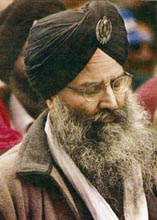Home > US Edition > Report
Revenge behind A-I bombing, court told
Allan Dowd in Vancouver, British Columbia |
April 29, 2003 09:42 IST
Two persons, accused of the 1985 bombing of the Air-India jetliner Kanishka [Flight 182], were 'terrorists' so driven by a need for revenge they were willing to kill 'hundreds of innocent people', a Canadian court was told on Monday.
Prosecutors opened their case against Ripudaman Singh Malik and Ajaib Singh Bagri, who were allegedly part of a group of Vancouver-based Sikh terrorists that conspired to destroy two Air-India jets simultaneously at opposite ends of globe.
The June 23, 1985, explosion of Flight 182 off the Irish coast, while on a flight from Canada to Britain and India, killed 329 people, making it history's deadliest act of aviation sabotage until the September 11, 2001, attacks.
Prosecutor Robert Wright said the Sikh separatists wanted revenge on India over the Indian Army's 1984 storming of the Golden Temple in Amritsar.

"It will be the position of the Crown that this motive was so strongly felt by the accused that they were prepared to murder hundreds of innocent people," Wright told the court.
Malik, 56, a wealthy Vancouver businessman, and Bagri, 53, a Kamloops, British Columbia, sawmill worker, are also accused of a bombing 54 minutes before Flight 182 went down that killed two workers at Tokyo's Narita airport.
The Tokyo bomb was in luggage being transferred to another Air- India flight.
The case against Malik and Bagri, both prominent members of Western Canada's large Sikh community, is based largely on statements they allegedly made to a handful of witnesses in the years after the bombing. The men were arrested in October 2000.
Malik's and Bagri's legal teams, who are working independently in the trial, which is being heard by a single judge, attacked the credibility of the prosecution's witnesses. They said the witnesses were only repeating rumours widely reported by the media after Flight 182 was destroyed.
"Even if there was a conspiracy, Bagri was not a member," his lawyer Richard Peck said in his opening remarks.
Malik's attorney, David Crossin, said the key witness against his client was also motivated by revenge because she was a former employee who had been fired. The media are banned from naming the witness by a court order.
Crossin opened his statement by acknowledging that the destruction of Flight 182 was a 'horror', but said it was important for his clients to receive a fair trial.
About two dozen relatives of the victims were in the courtroom, and said they were relieved the trial was finally getting underway. Members of Malik's and Bagri's family were also there, but sat on the opposite side of the room in the high-security facility specially built for the trial.
Majar Sindhu, of Vancouver, heard in court for the first time that Malik allegedly talked to his sister, niece and nephew several days before Flight 182 exploded, and although he knew they were going to be on the aircraft he did not warn them.
"Incredible," he said outside the courtroom, adding that he was confident the men would be convicted.
Prosecutors confirmed on Monday that they would also call Inderjit Singh Reyat and his wife as witnesses. Reyat pleaded guilty in February to a lesser charge of manslaughter for buying the materials used to make the Flight 182 bomb.
Prosecutors and defence attorneys also confirmed on Monday that they had reached a deal to admit large amounts of technical evidence about that bombing without arguments, which will reduce the amount of witnesses called.
Even on the speedier timetable, the trial is not expected to end until early 2004.
Among the evidence presented on Monday was that the X-ray machine used to screen baggage loaded on the doomed Flight 182 aircraft was not working, and the replacement system to detect explosives was unreliable.
The bags that contained the Flight 182 and Narita bombs belonged to male passengers who purchased one-way tickets in cash, using false names. They never boarded the aircraft.
Reuters